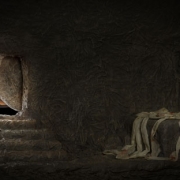Was man mit Geld nicht kaufen kann
Da sprach der König von Aram: Geh, ziehe hin, und ich will dem König von Israel einen Brief schicken! Da ging er hin und nahm zehn Talente Silber und 6000 Goldstücke und zehn Festgewänder mit sich. (2. Könige 5,5)
In diesem Vers geht es um einen General der syrischen Armee namens Naeman. Naeman war ein großer und ehrenwerter Mann mit viel Mut und Stärke (2. Könige 5,1). Er hatte beinahe in jeder Hinsicht Erfolg, doch er hatte Lepra. Das war nicht nur eine eklige Krankheit, sondern auch sein Todesurteil. Er würde an dieser normalerweise unheilbaren Krankheit sterben.

Durch ein junges Dienstmädchen hörte Naeman von einem Propheten in Israel, der ihn heilen konnte. Elisa war ein Prophet des lebendigen Gottes, und auch wenn er selber keine Wunder vollbringen konnte, gebrauchte Gott ihn doch viele Male um Wunder zu tun.
Naeman fragte seinen Chef – den König von Syrien– ob er ins Feindesland (Israel) gehen durfte, um den Propheten von Syriens Feinden zu bitten, ihn von der ekligen und tödlichen Krankheit zu heilen. Der König gab die Erlaubnis, und Naeman ging.
Unser Vers erzählt uns, dass er folgende Dinge mitnahm, um den Propheten, der ihn heilen konnte, damit zu bezahlen: zehn Talente Silber und 6000 Goldstücke und zehn Festgewänder.Das war einen Menge Geld. Ein Talent waren um die 33 Kilogramm. Bei den heutigen Preisen wären zehn Talente Silber 177.410 Euro wert. Ein Goldstück war 12 Gramm schwer. Die 6000 Goldstückewären heute 2.668.435 Euro wert. Man schätzt die zehn Festgewänderauf circa 4500 Euro.
Insgesamt nahm Naeman also 2.850.345 Euro mit.
Das ist eine große Summe, doch all das Geld konnte Naeman weder sein Leben noch Glück bringen. Naeman war bereit so viel auszugeben für etwas, das Gott ihm freiwillig geben würde. Wenn sie könnten, was würden die Menschen zahlen, um in den Himmel zu kommen? Um mit Gott ins Reine zu kommen? Um ein echtes und bedeutsames Leben zu haben? Um ihre Schuld auszulöschen? Dass ihre Sünden vergeben werden?
Naeman brauchte etwas, das nur Gott ihm geben konnte. Und Gott brachte ihm dies durch einen Propheten – einen Mann von Gottes Wort.
Gott und Sein Wort halten Schätze für dich bereit, die man mit Geld nicht kaufen kann. In einem Gebet zu Gott (Psalm 119,72) steht: Das Gesetz, das aus deinem Mund kommt, ist besser für mich als Tausende von Gold- und Silberstücken. Naeman sollte etwas bekommen, das man mit Geld nicht kaufen kann.
Hast du die größten Dinge von Gott erhalten? Die Dinge, die man micht mit Geld kaufen kann?












